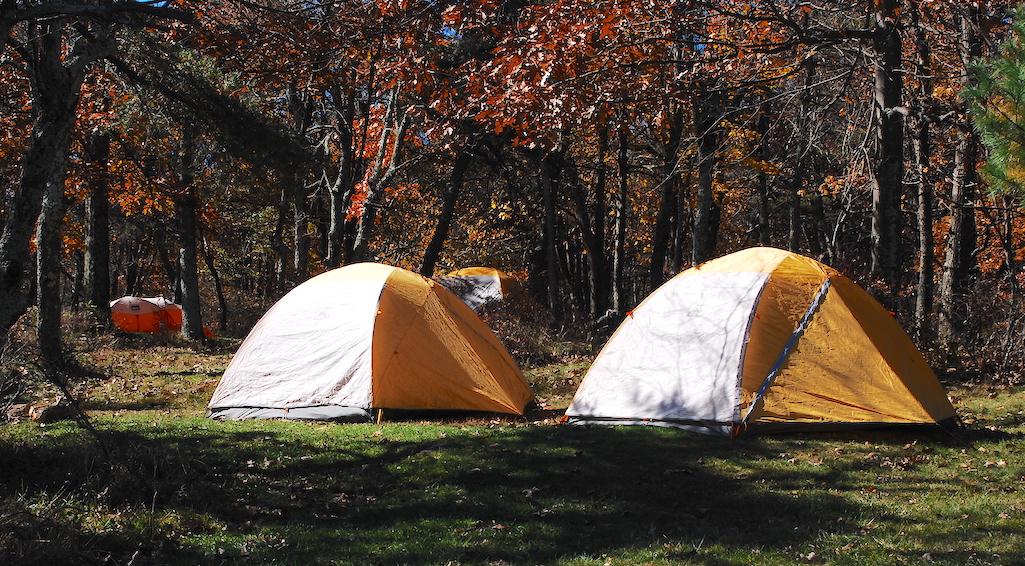
There could soon be a big jump in camping fees at Shenandoah National Park/Kurt Repanshek file
Insufficient federal funding and too many crowds are prompting the staff at Shenandoah National Park in Virginia to propose higher fees for camping, call for a permit system for backcountry camping, and require reservations for hiking up Old Rag.
The proposals aren't immediate, but would be implemented over the next two years if approved. Still, that the proposals were even made points to the dilemma many parks across the country face: too many visitors with too few resources.
In a release the Shenandoah staff pointed out that money collected at entrance stations, campgrounds, and through other user fees supports a great deal of work that would not otherwise be possible. Under the Federal Lands Recreation Enhancement Act, 80 percent of all fees are retained and utilized to improve Shenandoah for visitors. Over the past few years, these fee dollars have been used at Shenandoah to make improvements such as:
- Rehabilitation and maintenance of campgrounds, Skyline Drive and park trails are supported by fees. Examples include:
- New picnic tables, fire rings, and bear-proof food storage lockers were added at Big Meadows Campground and Picnic Area, Matthews Arm Campground, and Elk Wallow Picnic Area in the past four years.
- Over the past two years, restrooms at Big Meadows Campground were rehabilitated.
- The accessible Limberlost Trail was rehabilitated in 2021.
- Maintenance projects on 200-220 miles of trails were completed in the last three years.
- Construction of the Old Rag parking lot was completed in late 2019.
- To create a more valuable visitor experience, many services are supported by fees:
- Publishing park brochures and newspapers
- Visitor center staff
- Sanitation staff maintaining restrooms in campgrounds, picnic areas, and at visitor centers.
“Shenandoah National Park will use the increased revenue to fund projects and services that will benefit the visitor and contribute to the protection of Shenandoah’s natural and cultural resources,” explained Superintendent Pat Kenney. As a result, visitors can expect improvements in the campgrounds, in their backcountry camping experience, and at Old Rag, if the proposals are adopted, he added.
There are three user fees under consideration in the proposal:
- Increase the campground nightly fee to $30 at all four campgrounds from the current $15/$20 charge. Fees for group campsites, which accommodate up to 25 people at some locations, are also proposed to increase to $75. The increased fees will provide needed revenue to maintain and improve campgrounds.
- Implement a backcountry camping permit system that allows the park staff to track and understand backcountry use in a way that better protects the resource and provides an improved visitor experience. A fee-based online registration system through the recreation.gov website will allow users to plan their trip in advance with current information using a reliable system that will provide financial support for management of the park’s backcountry. A fee ranging from $20 to $30 is likely to depend on the number of backcountry nights for each permit. The permit system will modernize the backcountry permit system with online camping information and help protect the natural and cultural resources of the park. Park staff are still working on the details of how the system will work from the users’ perspective and will continue to plan for an implementation date in late 2022 or early 2023.
- Establish a pilot project for Old Rag Mountain visitor access through a new ticketing system at recreation.gov. The new system will require Old Rag users to get daily reservations in advance to help manage visitor use for most of the year. There will be a minimal ($1 to $2) processing fee during the pilot. Visitor use and expectations research indicates significant crowding and congestion at Old Rag at busy times. These studies indicate that managing total daily use during most of the year will improve visitor experience, reduce congestion and safety risks, and protect the rare ecological communities on the mountain. The majority of Old Rag users surveyed in 2019 supported a system to limit users to protect the environment or increase safety. The pilot is intended to test, evaluate, and adapt to a more permanent system (with a different use fee) in the future. The pilot ticketing is proposed to begin in March 2022.
To learn more about these proposals, you can attend one of two 1.5-hour virtual public presentations on August 24 at 7 p.m., and August 26 at 3 p.m. In person meetings will not be held because of the resurgence in COVID-19 cases in the region. The presentation will be followed by a question-and-answer session on the proposal. No comments or input will be officially accepted at those meetings. Feedback must be in writing on the website or input may be mailed to the superintendent. If you are unable to attend a meeting, you can find details about this proposal posted on the Shenandoah National Park website.
Comments must be received by September 16.
If you prefer, you may also send comments by mail:
Superintendent
Shenandoah National Park
3655 US HWY 211 East
Luray, VA 22835



Comments
I will continue to support our National Parks